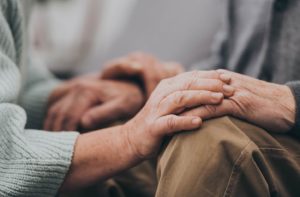
There comes a time in our lives when someone we love or care about loses a friend or family member. These are sad moments filled with a wide range of emotions and thoughts that can feel overwhelming for everyone involved. We want to be there for the person experiencing loss but we do not always know what to say, what to do, or even where to start. While there are a wide range of possibilities for how we can support someone else, three areas we might focus on include providing support at the funeral or memorial service, providing for short term physical needs, and providing for long term emotional and mental health needs. Using this threefold approach we have a game plan for how we can best be there for someone who has experienced loss.
At the Funeral
Funerals are sadness-tinged celebrations of someone’s life. Coming to the funeral is a meaningful way to show those left behind that we are there for them during their time of grief and mourning. When going to a funeral it is important that you consider things such as what to wear to the funeral and what to bring to a memorial service which might include flowers, sympathy cards, or pictures. These tokens are physical reminders that you are there to support your friend. Just showing up to the funeral can provide your grieving friend much needed emotional support during this challenging time. Seeing others celebrating the life of the one who passed away as well as mourning their death can help bring closure and comfort to the one who is grieving.
Physical Needs
While the classic casserole might feel a bit impersonal when someone we care about is experiencing loss it is symbolic of the importance of finding creative ways to provide physical or material support especially in the short term. This might look like ordering from someone’s favorite restaurant and having the food delivered. This might look like giving them a gift card so they can choose what would be most helpful. This might even look like coming over and helping with chores such as doing dishes or a few loads of laundry. Taking care of our friends’ physical needs means that they can focus on grieving and not on what to eat or if they have clean clothes left. If you are not sure what you could do to help materially consider what you would do if your friend was homebound with a broken leg. It is also important to know that those who are grieving are often not in the headspace to say thank you, but that does not mean your efforts are not noticed or appreciated.
Emotional Support
When someone we care about has suffered a loss one of the best ways we can provide long term support is by simply being present. All too often we allow our own discomfort to keep us from reaching out to the person who has suffered a loss. We are not sure exactly what to say, so we say nothing at all. But oftentimes this lack of communication can feel like being forced to grieve all alone. Supporting someone who has experienced a loss can look like simply giving the person grieving supportive space where you simply listen to the mixed emotions they are experiencing. Sometimes simply having someone who says I see you and will sit with you during this time can make all the difference to someone who is grieving.
It is also important that we keep an eye on the person grieving because grieving can slip into more serious issues such as depression. In our role of providing emotional support it is also important that we are able to see how our loved one is doing. If someone’s grief seems to be worsening instead of getting better we may have to step in with various mental health supports such as info about a local grief support network or information about a good therapist who might be able to help our loved one process their loss. Loss is experienced differently by each person and there are moments when we need an outside support network to help us process our loss and help us move into the world while carrying loss.